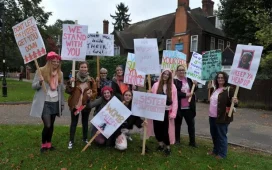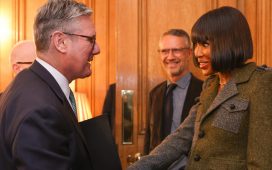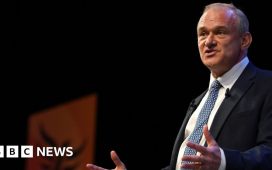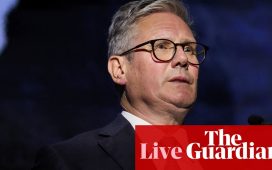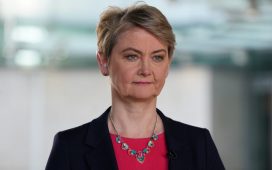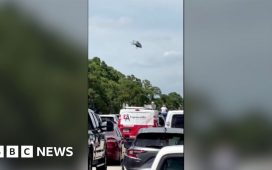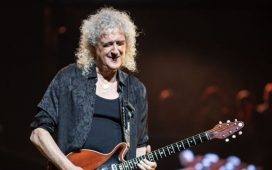US imposes new sanctions on Russia over attempts to ‘subvert and polarize free and open societies’
Antony Blinken said the US is imposing new sanctions on Russia over its role to ‘undermine democracies’.
The US secretary of state said:
Today, we’re imposing sanctions on three entities and two individuals for Russia’s covert global influence operations, including interference in Moldova’s democracy and its upcoming elections.
The actions we’re exposing today and the actions we exposed last week do not incorporate the full scope of Russia’s efforts to undermine democracies. Far from it.
Russia’s weaponization of disinformation to subvert and polarize free and open societies extends to every part of the world. In response, today, the United States, United Kingdom and Canada are launching a joint diplomatic campaign to rally allies and partners around the world to join us in addressing the threat posed by RT and other machinery of Russian disinformation and covert influence.”
Key events
Closing summary
In a one-on-one meeting at the White House on Friday, Joe Biden and Keir Starmer discussed pleas from Ukraine for their support to use long-range missiles in the war against Russia. No official position was announced after the roughly 20-minute meeting, during which the US president and UK prime minister also reportedly discussed challenges in the Middle East.
The meeting came after mounting pressure from both Ukraine and Russia about intervention in the war.
“We are now in the third year of a full-scale war. After so much death, destruction and countless Russian war crimes, Putin can still afford to destroy life in Ukraine as he pleases, buy and produce missiles, bombs and artillery, and issue ultimatums to the world,” Volodymyr Zelenskiy, the Ukrainian leader, said in a post on X on Friday before the meeting. “He expects the world to fall for his madness.”
Meanwhile, Vladimir Putin threatened that if the US and UK agreed to loosen restrictions on long-range strikes into Russia, it would be seen as an act of aggression signifying Nato countries were “at war”.
“This will mean that Nato countries – the United States and European countries – are at war with Russia,” Putin told Russian reporters on Thursday. “And if this is the case, then, bearing in mind the change in the essence of the conflict, we will make appropriate decisions in response to the threats that will be posed to us.”
More on these discussions – and the decisions the countries come to – are expected in the coming weeks as leaders reconvene at the United Nations general assembly later this month.
This wraps our live coverage for today. You can continue to read our expert analysis and key updates here.
Thanks for tuning in with us as we gather the latest updates! Have a good night.
Keir Starmer has left the White House after his discussions with Joe Biden, telling reporters gathered outside that the “long and productive discussion,” focused on Ukraine, the Middle East and the Indo-Pacific, according to the BBC.
He did not disclose whether the two leaders agreed to support the use of long-range missiles and, though he emphasized that Ukraine has a right to defend itself, he said Putin will have to end the war.
Politico reports that no final decision was made on the use of Storm Shadow missiles, which action Putin threatened would be taken as an escalation and as Nato involvement in the war. Starmer said the issue will be taken up again at the United Nations general assembly at the end of September.
“We’ll obviously pick up again in UNGA in just a few days time with a wider group of individuals,” he told reporters.
Interim summary
Here is where things currently stand:
-
Keir Starmer arrived at the White House on Friday to meet with Joe Biden. The two leaders are expected to discuss the possibility of expanding Ukraine’s long-range missile capabilities.
-
Volodymyr Zelenskiy met with American actor Michael Douglas and his son Dylan in Kyiv amid Ukraine’s ongoing war against Russia. In a post on X, Zelenskiy said they, alongside Ukrainian first lady Olena Zelenska, discussed “the situation in our country, cooperation with partners, support for Ukraine, and the fourth Summit of Ladies and Gentlemen”.
-
David Petraeus, the former CIA director, said Vladimir Putin is bluffing over his red line on long-range missiles and that there’s nothing more “conventionally that he can actually do that he’s not already doing”. Petraeus, speaking to the BBC, said the potential lifting of restrictions over the use of long-range weapons inside Russia was “long overdue” and “it’s never too little too late”.
-
Antony Blinken said the US is imposing new sanctions on Russia over its role to “undermine democracies”. The US secretary of state said: “The actions we’re exposing today and the actions we exposed last week do not incorporate the full scope of Russia’s efforts to undermine democracies. Far from it.”
-
European policy leaders are downplaying Vladimir Putin’s war threats over Ukraine’s potential allowance to expand its long-range missile usage. “It is necessary to take all events in Ukraine and on the Ukrainian-Russian front very seriously, but I would not attach excessive importance to the latest statements from president Putin,” said the Polish prime minister, Donald Tusk. “They rather show the difficult situation the Russians have on the front,” he added.
-
Boris Johnson met with Volodymyr Zelenskiy in Kyiv on Friday and renewed calls for Britain to allow the country to use Storm Shadow missiles against targets in Russia. “It is vital that Ukraine should be able to defend itself properly by stopping the appalling Russian attacks with glide bombs and now Iranian missiles,” the former UK prime minister said following the meeting.
-
Germany’s chancellor has said he will not send long-range missiles to Ukraine, despite Ukraine’s insistence on the weapons. At a press conference on Friday, as reported by Agence France-Presse, Olaf Scholz said: “Germany has made a clear decision about what we will do and what we will not do. This decision will not change.”
-
In contrast with Germany, Canada said on Friday that it fully supports Ukraine’s use of long-range weaponry in its war against Russia. Speaking to reporters, Justin Trudeau said that his country supports Ukraine’s use of the weapons to “prevent and interdict Russia’s continued ability to degrade Ukrainian civilian infrastructure”, Reuters reports.
In his opening remarks before his meeting with the UK prime minister Keir Starmer, Joe Biden said:
“First, Ukraine, I want to thank you for the UK leadership on this front. The United States is committed to standing with you to help Ukraine as it defends against Russia’s onslaught of aggression. It’s clear that Putin will not prevail in this war. The people of Ukraine will prevail.”
In response, Starmer said:
“Thank you for the invitation to be back here just two months after our last meeting here, and it’s really important to us great allies, that special relationship have this time to talk about the global issues you have just identified, starting, of course, with Ukraine, where I think the next few weeks and months could be crucial, very, very important, that we support Ukraine in this vital war of freedom.”
Joe Biden: ‘I don’t think much about Vladimir Putin’ over Russian president’s threat of war
In response to a question on what he thinks about Vladimir Putin’s comment on a “war with Russia” over the possibility of Ukraine’s expanded long-range missile capacity, Joe Biden said:
I don’t think much about Vladimir Putin.
Starmer arrives at White House to speak with Biden
Keir Starmer has arrived at the White House before his meeting with Joe Biden. The UK prime minister and the US president are expected to discuss the possibility of expanding Ukraine’s long-range missile capabilities.
Volodymyr Zelenskiy met with American actor Michael Douglas and his son Dylan in Kyiv amid Ukraine’s ongoing war against Russia.
In a post on X, Zelenskiy said they, alongside Ukrainian first lady Olena Zelenska, discussed “the situation in our country, cooperation with partners, support for Ukraine, and the fourth Summit of Ladies and Gentlemen”.
Speaking to Zelenskiy, Douglas called him an “inspiration” and a “great reminder for our country about what democracy means”.
I had a meeting with American actor, producer, and UN Messenger of Peace Michael Douglas and his son Dylan.
We discussed the situation in our country, cooperation with partners, support for Ukraine, and the fourth Summit of First Ladies and Gentlemen.
We greatly appreciate that… pic.twitter.com/QcKGQcvX8u
— Volodymyr Zelenskyy / Володимир Зеленський (@ZelenskyyUa) September 13, 2024
David Petraeus, the former CIA director, said Vladimir Putin is bluffing over his red line on long-range missiles and that there’s nothing more “conventionally that he can actually do that he’s not already doing”.
Petraeus, speaking to the BBC, said the potential lifting of restrictions over the use of long-range weapons inside Russia was “long overdue” and “it’s never too little too late”.
He said he believed the Russian president was bluffing, adding that the Russian leader “has established innumerable red lines before. The Ukrainians and/or western countries have crossed just about all of them.
He’s even rattled the nuclear sabre so much so that his own biggest ally and partner China, President Xi, said don’t even think about that. As did [Narendra Modi, the Indian prime minister], an important customer in India for Russian crude oil and so forth. So no, I don’t think there’s anything more conventionally that he can actually do that he’s not already doing.
Ukraine’s prime minister, Denys Shmyhal, said the government has approved the 2025 draft budget, which has a strong focus on defence spending.
The budget, which will be submitted to parliament, provides for 2tn hryvnias ($48.2bn)in revenues and 3.6tn hryvnias in expenditures, according to Reuters. It also includes a provision of 2.22tn hryvnias ($53.5bn) for defence.
Shmyhal said preparations in drafting the budget – the third since the start of Russia’s invasion – had been completed “despite all the challenges and uncertainty”. He added:
The priority for this budget is very clear – the country’s defence and security.
There would be “more money for Ukrainian weapons, equipment, drones”, he said.

Phillip Inman
The International Monetary Fund (IMF) will send staff to Moscow next week to review the Russian economy for the first time since the invasion of Ukraine, in a move that has prompted anger and dismay across European capitals.
Officials of the Washington-based organisation will travel to the Russian capital and meet “stakeholders” before publishing an assessment of the economy and providing recommendations about how the Kremlin might improve its economic handling and tackle issues such as the climate crisis.
After Moscow’s invasion of Ukraine in February 2022, the IMF stopped its annual consultations with Russia. The organization said it was a “mutual obligation” to carry out an article IV review of a member country and that the process was only suspended because of the volatility of economic data. The situation in Russia was now “more settled”.
On Friday, nine European countries protested against the IMF’s plans, saying it would damage the reputation of the Washington-based fund to resume dialogue with a country that had invaded another.
“We would like to express our strong dissatisfaction with such IMF plans,” the finance ministers of Lithuania, Latvia, Estonia, Finland, Sweden, Iceland, Denmark, Norway and Poland said in a letter to the IMF managing director, Kristalina Georgieva, seen by Reuters.
Drone operators and a volunteer medic have given the Guardian an inside look at their efforts to evacuate casualties on the frontlines of the Ukrainian incursion.
The Guardian’s Shaun Walker reports:
Deep into one recent night, at a Ukrainian mobile drone command point hidden amid the fields and forests close to the border with Russia, the largest of six screens flashed with images of the wiggling course of the River Seym, deep inside Russia on the other side of the border. Straddling the river, a thin band was visible, rendered in white by the night vision imaging: a pontoon bridge.
Inside the command point, Anna, Pavlo and Ivan watched the display intently. “Move in closer,” murmured Ivan, the team’s 48-year-old commander. Pavlo pushed a button and the camera zoomed in. “Yesterday, we destroyed this crossing, but they’ve repaired it again, probably in the last few hours,” he said, picking up his phone to send the information to an encrypted group chat of Ukrainian commanders in the area.
For the full story, click here:
In response to a question on Vladimir Putin’s statement on potential “war with Russia” over Ukraine’s long-range missile capacities, Karine Jean-Pierre, the White House press secretary, said on Friday:
I’m not going to get into hypotheticals. I’m not going to get into internal policy deliberations from here. I will say what you’ve heard from my [National Security Council] colleagues at this podium, you’ve heard from this president: this war can end today if Mr Putin will end the war that he started. It is his aggression. It is his war that he started. He can end it. He could end it. I’m going to leave it there.
She added:
We are going to do everything that we can so that Ukraine has what it needs to defend itself. That is our commitment. I think you have seen this, a very much focused, a tremendous amount of support from this administration and also from our partners and allies in doing just that. And that’s what you could expect to see.
Volodymyr Zelenskiy has thanked Finland for its provision of another defense package in its war against Russia.
In a statement on X, the Ukrainian president wrote:
I am grateful to @alexstubb and @FinGovernment for Finland’s decision to provide Ukraine with another defense package, valued at 118 million euros. This brings the total value of Finland’s military aid to Ukraine since Russia’s full-scale invasion to 2.3 billion euros.
Zelenskiy added:
This support is not just about defending Ukraine – it’s about protecting the people of all Europe and strengthening our entire continent. The security of Europe’s eastern flank can only be ensured through our continued unity and cooperation.
I am grateful to @alexstubb and @FinGovernment for Finland’s decision to provide Ukraine with another defense package, valued at 118 million euros.
This brings the total value of Finland’s military aid to Ukraine since Russia’s full-scale invasion to 2.3 billion euros.
We…
— Volodymyr Zelenskyy / Володимир Зеленський (@ZelenskyyUa) September 13, 2024
US imposes new sanctions on Russia over attempts to ‘subvert and polarize free and open societies’
Antony Blinken said the US is imposing new sanctions on Russia over its role to ‘undermine democracies’.
The US secretary of state said:
Today, we’re imposing sanctions on three entities and two individuals for Russia’s covert global influence operations, including interference in Moldova’s democracy and its upcoming elections.
The actions we’re exposing today and the actions we exposed last week do not incorporate the full scope of Russia’s efforts to undermine democracies. Far from it.
Russia’s weaponization of disinformation to subvert and polarize free and open societies extends to every part of the world. In response, today, the United States, United Kingdom and Canada are launching a joint diplomatic campaign to rally allies and partners around the world to join us in addressing the threat posed by RT and other machinery of Russian disinformation and covert influence.”

